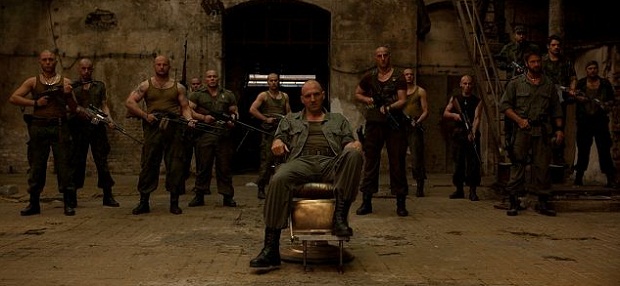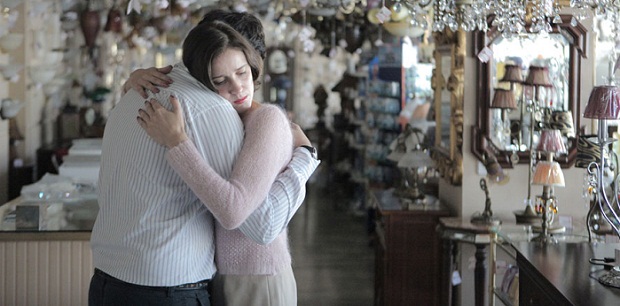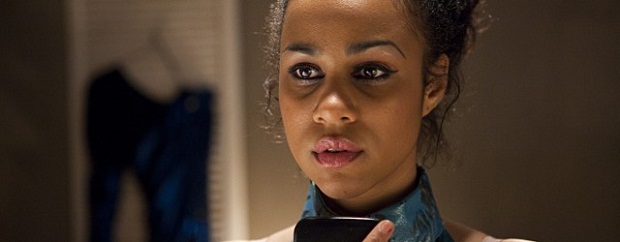Note: I also saw the first two parts of the German triptych Dreileben yesterday, I’ll watch the third later today and prepare a special, additional, diary post for them tomorrow.
Note: I also saw Dreams of a Life earlier in the festival, but my review has been embargoed until now.
Sunday was easily my most anticipated day for this year’s London Film Festival, because it brought the UK premiere of Dogtooth director Yorgos Lanthimos’ Alps, which has been my most anticipated film of 2011, and which I was unreasonably excited to see at its public screening. Did it live up to my hopes and expectations…?
CORIOLANUS (Ralph Fiennes)

Apparently Ralph Fiennes has wanted to turn Shakespeare’s Coriolanus (about a heroic Roman General elected by, then banished from, then returning to seek revenge on the people of Rome) since he first played the role on stage more than a decade ago. The surprise about his version, coming from an actor whose approach seems so classical, is the modernity and the energy of the tale’s telling.
Fiennes sets the film in ‘a place calling itself Rome’, in an unspecified time, but to me the look was most redolent of the images of the various Balkan wars of the 90’s (no surprise, given that the film was made in Belgrade). It’s also redolent – courtesy of cinematographer Barry Ackroyd – of The Hurt Locker, especially in its early scenes of massed crowds of protesters and battles, all captured with that same slightly grainy, shaky, aesthetic. It makes you wonder just how much of the visual side of the film really comes from début director Fiennes, and how much from his DP.
What you would expect Fiennes to have real control over is the acting, and for the most part the cast, and through them their director, impress. The standouts are Brian Cox as Senator Menenius, playing the consummate politician; always visibly calculating his responses and the way he addresses the present audience and Vanessa Redgrave as Coriolanus’ Mother, giving incredible depth of emotion and contemporary feel to 400 year old dialogue. Quality runs deep in this cast, with smallish roles for the likes of Jessica Chastain (as Fiennes’ wife) and the brilliant Belgian actress Lubna Azabal. However, the acting can be patchy, I suspect that Fiennes spread himself a little too thinly, directing a complex first film on a short schedule and playing the leading role. In the quieter scenes he is excellent – few seethe on screen as well as he does – but when the tone gets more bombastic, and the acting larger, Fiennes slips into his Voldemort performance (especially in the very last scene, when he hisses BOY at Gerard Butler). A couple of cast members also seem out of their depths; James Nesbitt may be speaking Shakespearean dialogue, but he is inescapably James Nesbitt, and Gerard Butler – though not guilty of as much shouty hammery as Fiennes – seems to struggle with the text, and often seems to be reading his lines.
Coriolanus is best in its energetic first 45 minutes, but begins to slip when it becomes more about politics than war, some of the modern symbolism hangs quite heavily on the film, and yet Fiennes doesn’t have a clear enough take on the time and place to give it real resonance. While it is patchy, what works – notably anything with Cox or Redgrave – works brilliantly, and many of the speeches still resonate strongly. If Fiennes restrains himself a little more in the future (a less complex shoot and a small part for himself perhaps) there is evidence here that he may make an interesting actor’s director yet, but Coriolanus is too hit and miss to be judged a real success.
2.5 / 5
ALPS

Alps is not, and was never likely to be, the gut punch that Yorgos Lanthimos’ Dogtooth was. That film came out of the blue and slapped me in the face at LFF 2009, this one has the weight of two years of expectation on it. It is not Dogtooth; it’s a slower burn, it demands more of us, it asks us to figure out much more of what is happening, but the rewards are great and, I suspect, likely to grow as you see the film more than once.
The ALPS of the title are not a mountain range but four people (including Dogtooth star Aggeliki Papoulia and Ariane Labed, the lead in producer Athina Rachel Tsangarai’s LFF 2010 film Attenberg) who ‘stand in’ for the relatives of the recently bereaved, apparently to help them get over the loss. The film unfolds as a series of vignettes, largely focused on Papoulia’s character; a nurse by day as she goes about her stand in work and (maybe) her real life.
Though less rigorously austere in its camera style, Alps is nevertheless visually striking from the very start. The opening shot is one of the most striking of the year; the skinny, beautiful, Labed standing stock still in a leotard as O’Fortuna booms out of the speakers and she waits to start a rhythmic gymnastics routine. In visual terms, Lanthimos uses stillness and focus beautifully throughout the film, making clever use of shallow focus shots to further blunt our perception of what is real.
Lanthimos also has great control of the atmosphere of the film, ALPS leader Mont Blanc (Aris Servetalis) seems a hard man, controlling and cold, and this, along with the intentionally slightly stilted acting and the overarching theme of unreality, lends an unease to the entire film, and particularly to scenes of the group together. Some scenes, such as those of Monte Rosa (Papoulia) working with the parents of a girl she nursed, standing in for their deceased, tennis playing, daughter, are clearly constructs, others are not so clear cut. Throughout the film I went back and forth on whether the character we are told is Monte Rosa’s Father is her father or a client. Lanthimos probably doesn’t want us to know, and this and other persistent questions are just a few of the reasons Alps is so fascinating.
This is a strange film; brutal in tone and, once, content; often extremely funny, in a none more black way; disturbing and absurd; simple in construction but deeply complex in tone and content. It may not be the instant classic that Dogtooth was, but I’ve hardly stopped thinking about Alps since I saw it, and I am sure I am still many days and many screenings from figuring it out. There was no film I wanted to see more this year, there is now no film I am more anxious to revisit.
5 / 5
DREAMS OF A LIFE (Carol Morley)

In the Frightened Rabbit song Yes I Would, Scott Hutchinson sings “I wonder if they’d notice if I’m not around / the loss of a lonely man never makes much of a sound”. The loss of Joyce Carol Vincent, at the tragically early age of 38, was soundless. She died alone in her flat, the TV on, half wrapped Christmas presents around her. It would be three years before she was found.
This story intrigued filmmaker Carol Morley, and Dreams of a Life is the result, something of an elegy for Joyce, it talks to friends, acquaintances, co-workers and former flames, all of whom seem baffled by the fact that this could happen to a woman who was, by all accounts, vivacious and well liked. Morley reconstructs Joyce and her life through reminiscences, occasionally cutting to reconstructions with Zawe Ashton playing Joyce. This choice could have been cheesy, or worse, exploitative, but these scenes are some of the most interesting in of Dreams of a Life; they are Morley’s visions, and possibly Joyce’s friends visions too, of how Joyce was, and how she might have been.
Dreams of a Life is a moving film, and seldom more so than in the various interviews with Joyce’s long time friend and sometime partner Martin; a slightly pudgy, balding, mid 40’s, he seems an unlikely candidate to have been with someone like Joyce, but the connection still clearly runs very deep, and his story is really the beating heart of the film. There is just one image of Joyce, a stolen shot to close the film, but it is the perfect way to close this impressive mediation on the weight of one forgotten person.
4 / 5



